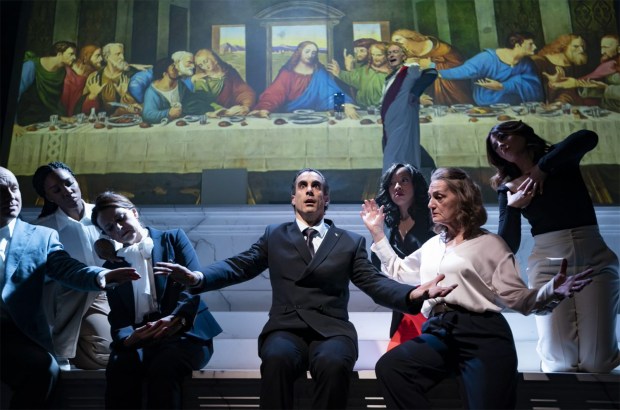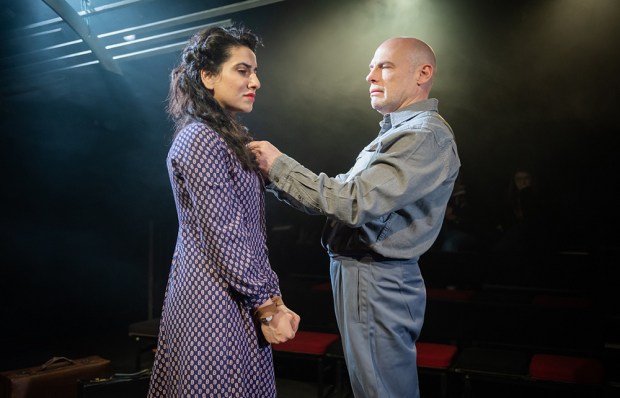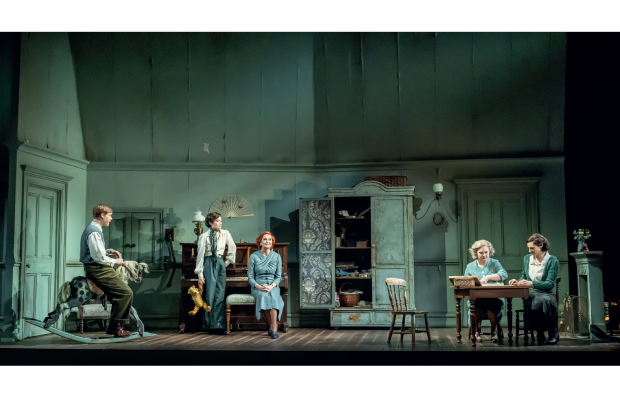Sasha is angry. He’s a gay artist on his way to his niece’s birthday party and he keeps popping codeine pills to get him through the dull ceremony ahead. His devoted boyfriend, Chet, hasn’t realised that Sasha’s drug habit is a full-blown addiction but Sasha is highly secretive.
He shows us two sides of his nature at once. Outside, he’s a friendly smiling uncle who dutifully attends family celebrations. Inside he’s spitting with rage at his brother’s cosy life and its trite domestic rituals. When he greets his pregnant sister-in-law he grins politely while fuming to himself: ‘There’s a billion family photos here. If I spat anywhere I’d hit one.’
From the garden he can hear two kiddies, Bluebell and Peaches, bouncing on a trampoline. ‘The noise is making my teeth crumble.’ Out comes the cake with the candles aflame. ‘Everyone is smiling and singing “Happy Birthday”,’ he rages. ‘Jesus! There’s never a maniac with a machine-gun when you need one.’
This bitter, lonely misfit sounds rather hard to like but he’s a fascinating creation because his internal running commentary is a universal experience. He is also observant and richly sarcastic. When Chet delivers the birthday present, he’s thanked warmly by the niece’s mum. ‘She squeezes his hand like she’s been on dialysis for a decade and he’s promised her a kidney.’
Sasha doesn’t just stew in his rage, he acts on it. Separating himself from the party, he roams the house and secretly destroys small ornaments and displaces family photographs. Which of us hasn’t been tempted by such petty vandalism when faced with a happier and more successful relative?
It’s unclear why Sasha is so angry with his brother until a big secret emerges involving a sudden death and a mysterious fire. The surprise is skilfully delayed by the playwright, Philip Ridley, who handles his material like a master whodunnit writer.
The show ends on a note of redemption. A child’s drawing soothes Sasha’s fury and an unexpected declaration confirms his faith in life. It’s an oddly sugary way to end such a vicious dissection of bourgeois conventions. Joseph Potter, a brilliantly gifted youngster, plays a dozen roles with mesmerising dexterity. After 100 minutes you feel as if you’ve sat through a riveting Mike Leigh movie and yet you’ve seen nothing more than an actor, with no costumes or special effects, alone on a bare stage.
The estimable Lucy Kirkwood has updated Hedda Gabler for Bristol Old Vic Theatre School. The show is supplemented by ‘Trigger Warnings’ (their capitals): guns, smoking, and loud noises. Modern versions of Ibsen are always tricky beasts. His plays depend heavily on the morality of the 19th century and its strict taboos which characters could break only at great personal risk. To drag him from his historical context and dump him in the modern world is apt to destroy his meaning. It’s like putting a dolphin in a sandpit and wondering why it can’t balance a ball on its nose.
Kirkwood sets the show in a Notting Hill mansion where George Tesman, a workaholic dullard, lives with his new bride, Hedda. ‘Stuck in Nappy Valley,’ she mopes, ‘with nothing to do.’ Is she content? ‘I don’t see any reason why I should be.’
The original Hedda is a rebellious fun-seeker who risks disgrace by reviving an affair with an old flame. But to make her a petulant yuppie destroys our sympathy with her character and removes the dramatic purpose of her frustration. This modern Hedda has no reason not to divorce boring old George, but in the 19th century she was expected to support her snuffling, snoring spouse for ever.
That’s the starting point of her character and here it’s missing. Other figures have been damaged in transit as well. Lovborg is an inspirational romantic philosopher whom Hedda adores. In Kirkwood’s update he becomes ‘Langford’, a trendy lecturer whose genius and sexual charisma are difficult to detect. Judge Brack, the sexual creep who ensnares Hedda at the end, has turned into a friendly geezer called Toby who likes to go out on the lash.
Toby seems to fancy Hedda a bit. She fancies him a bit as well, but not as much as he fancies her. So what? Is there any reason they shouldn’t have a quickie on the sly? And yet Toby’s sexual proposition drives Hedda to despair and leads to the play’s bloody climax. It makes no sense emotionally. And so this great tragedy, a cornerstone of feminist literature, has been turned into a trite soap opera about a few aimless trustafarians in west London. An amazing achievement. A political play shorn of political content.
As for the ‘loud noises’, they turned out to be muffled gunshots fired off-stage. Only a sleeping child would be disturbed by such a sound. Perhaps that’s their target audience.
Got something to add? Join the discussion and comment below.
Get 10 issues for just $10
Subscribe to The Spectator Australia today for the next 10 magazine issues, plus full online access, for just $10.
You might disagree with half of it, but you’ll enjoy reading all of it. Try your first month for free, then just $2 a week for the remainder of your first year.














Comments
Don't miss out
Join the conversation with other Spectator Australia readers. Subscribe to leave a comment.
SUBSCRIBEAlready a subscriber? Log in